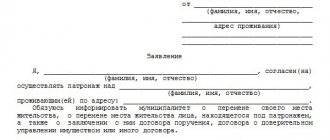Home » Inheritance » Making a will for a house and land
3
The purpose of purchasing a house, land, summer cottage or any other property is not only to provide for current needs, but also the desire to financially support loved ones after death. Acquired property is divided between relatives by law or transferred on the basis of a testamentary document to the persons specified in it, regardless of the presence of family ties.
Methods of inheritance distribution
In the absence of an administrative document, the property of the deceased is distributed among relatives on the basis of Art. 1141 of the Civil Code of the Russian Federation. According to the law, values are divided between the heirs of each of the 8 lines, and the next line cannot claim its rights if there are representatives of the previous one, and the shares of inherited property are equal for members of one line. Children, spouses, parents, and descendants of children by right of representation have advantages over all heirs.
The order of inheritance can only be changed by making a will. This right is enshrined at the legislative level in Art. 1119 of the Civil Code of the Russian Federation.
A will is an act of the unilateral will of a citizen, establishing the procedure for civil legal relations in the event of his death.
The claimants to the property specified in the document are the heirs, and the owner of the distributed benefits is the testator. The latter can dispose of property the owner of which is or plans to acquire (Article 1120 of the Civil Code of the Russian Federation): an apartment, a house, a car, a plot of land, money in a bank, and other valuables.
Unlike inheritance by law, in the case of drawing up a will, the heirs may be persons who do not have family ties with the owner of the valuables, private or public organizations.
Who can become a testator
All capable citizens have the right to bequeath their property. By law these are:
- adults (over 18 years old);
- emancipated (children over 16 who were granted full legal capacity due to marriage or in accordance with a decision of the guardianship and trusteeship authority or the court).
However, these categories of persons may be deprived of the opportunity to independently dispose of their property and bear responsibility for their actions (at least within the boundaries of the legal space). This occurs when a citizen is diagnosed with a severe mental disorder - a disease that makes a person unable to think logically and clearly, be aware of his actions and soberly assess the environment.
There are also milder degrees of deviations, when a person is partially deprived of these abilities, due to a less serious deviation or unhealthy psychological dependence. In this case, he will be recognized as having limited legal capacity. But this does not in any way affect the ability to dispose of one’s property—a citizen with limited legal capacity also does not have the right to draw up a will.
A court can deprive or limit a person of legal capacity based on an application from relatives or other interested parties. The full scope of civil rights is restored in a similar manner (when the patient’s mental health has returned to normal).
The capacity of the testator at a personal reception must be verified by the person certifying the expression of will instead of a notary. This is done not on the basis of the presence or absence of an official document on deprivation of legal capacity, but on the external signs of the applicant. Since a testator may be incompetent or partially capable, regardless of whether he is recognized as such by the court. And, if something in the behavior of the testator arouses the suspicions of the authorized person, he has the right to demand from him a certificate from a psychoneurological dispensary or refuse the certificate.
Who cannot be excluded from the number of heirs
When drawing up a will, it is necessary to take into account that there is a group of persons who have the right to an obligatory share in the inheritance. Citizens included in the category of socially vulnerable include:
- minor children (under 18 years of age);
- people of retirement age, as well as children who are not working, but are receiving a specialty in full-time education and have not reached the age of 23;
- disabled citizens who are dependent on the owner of the goods and live with him in 1 territory for at least 1 year.
Such groups of persons are entitled to at least ½ share of the property that they would receive upon inheritance by law.
Example. Citizen N. drew up a will, according to which the house was to be inherited by his partner T. Since N. had a minor child, in accordance with Art. 1149 of the Civil Code of the Russian Federation, the property was divided in this way: ½ of the house went to T., and ½ to the child.
In order for the document to be legal, you need to familiarize yourself with information on how to make a will for a house and land in a legally competent manner.
How to insure yourself in advance and what you need to consider
As a conclusion, I would like to say a few more words. You are not obliged to explain to anyone who you are leaving your property to and why. It's yours, not your children's or spouse's. You have the right to make any transactions yourself.
If you want, give it to the state, an outsider or a charitable organization. Of course, you cannot completely disinherit a spouse with a disability or a child who has not reached the age of majority.
Therefore, take care of this in advance. Just in case, do not forget to collect the documents mentioned above. Otherwise, the procedure should not cause any problems.
Registration procedure
First, you need to visit the notary’s office at your place of residence or, in case of limited mobility, call a notary at your home.
Required conditions for drawing up a will:
- The testator must be the sole owner of the property. You cannot inherit an extension to a house, or transfer a plot of land in its entirety, owning only part of it. Also, land plots issued with the right of perpetual use are not subject to inheritance.
- The capacity of the owner of valuables should not be questioned. You can only draw up a document with a strong memory and sound mind.
- At the time of preparation, the citizen must be 18 years of age.
You can write a will:
- on a computer, that is, in printed form;
- by hand.
The document is drawn up either by the owner of the property personally, or by a notary on his words. If a citizen cannot read what is written, the notary reads the document and indicates in it the reason why the testator did not do it personally (for example, blindness). To avoid suspicion of falsification, you can invite a witness. At the end, the signature of the testator, as well as the witness, indicating his full name and place of residence, must be placed.
The document contains the following information:
- place and date of compilation;
- complete information about the testator (full name, place of registration and place of residence, passport details: series, number, place of issue);
- text that lists the values and indicates the circle of heirs;
- information that the notary has given clarifications regarding Art. 1149 Civil Code of the Russian Federation;
- notarization (in the case of a closed will, the notarization is placed on a sealed envelope);
- number of copies;
- confirmation of payment of state duty.
Expenses
The cost of notary services that the testator will have to pay depends on the following factors:
- location of the notary office (the price of services largely depends on the locality);
- whether the notary is involved in drawing up the text of the will or only checks it.
As for document approval, there is a single cost for such services throughout Russia, which is equal to 100 rubles per page of the document. This state duty is required to be paid by all testators.
Sample will for house and land
The will is drawn up in 2 copies, 1 of which is kept by the notary, and the second by the owner of the inheritance.
There is no need to fear pressure or dissatisfaction from potential heirs. The document will come into force only after death, and according to Art. 1130 of the Civil Code of the Russian Federation, its content can be partially or completely changed, without requiring anyone’s consent.
According to Art. 1123 of the Civil Code of the Russian Federation, the contents of the document are a secret, which is subject to disclosure only after the opening of the inheritance. The rule applies to a witness present when drawing up an act of unilateral will.
Documents for a will for a house and land
The testator is obliged to provide the notary with a passport. The notary has no right to demand confirmation of ownership of the specified property and valuables. However, in order to identify objects and avoid misunderstandings, it is additionally recommended to have with you:
- agreement of donation, exchange or sale of a house;
- certificate of state registration of real estate;
- confirmation of ownership of a land plot with a cadastral plan reflecting the location of communications;
- a certificate of the inventory value of the property taken from the BTI;
- a certificate confirming that the testator was not officially married at the time of acquisition of the property, otherwise ½ of the property is the property of the legal spouse;
- a certificate of mental health, which will prevent the will from being invalidated in the event of disputes between the heirs.
The testator can inherit a dacha with a plot, and it is necessary to provide documents taken from the BTI: cadastral extract and plan, certificate of ownership and calculation of the cadastral value of the land plot and buildings.
The notary may recommend attaching additional documents to facilitate the process of transferring real estate after the opening of the inheritance.
Witnesses
Certification of the property dispositions of the testator without the participation of a notary in most cases requires the presence of witnesses. They are needed:
- When making a will in emergency circumstances.
- In cases where the certifiers are ship captains, commanders of military units, doctors, directors and heads of places and expeditions, while staying in which the testator was deprived of access to receive notarial services.
In the first case, two witnesses are required, in the second, one is sufficient. And in each of them, the persons present must meet the following requirements:
- literacy;
- full legal capacity;
- knowledge of the language in which the expression of will was made;
- obvious disinterest (the heir or legatee under the will, their parents, children and spouses, as well as the person certifying the deed cannot be chosen as a witness);
- adequacy and sobriety.
All requirements presented to witnesses are equally relevant for the person who committed the assault (if his participation is provided for by law).
When making posthumous property dispositions, the availability of documents for the testator is important, regardless of whether a notary is involved in the procedure or not. The only exception is a will in emergency circumstances, which, for already known reasons, is made in a special manner.
In all other cases, the testator is required to provide identification. This document does not necessarily have to be a passport of a citizen of the Russian Federation. Instead, it is allowed to present:
- passports of a sailor or military personnel;
- passport of a citizen of another country;
- resident card;
- temporary residence permit on the territory of the Russian Federation;
- another document that allows you to reliably establish the identity of the applicant.
And about. A notary in a locality or outside the Russian Federation may require a certificate from a psychoneurological dispensary from the testator, but the testator is not obliged to provide it. At the same time, when refusing to provide a medical report, the testator (especially those over 70 years of age) must keep in mind that this may be followed by a refusal of the certificate and even a subsequent challenge to the act due to “incomplete legal capacity of the testator.”
Witnesses or the person presenting the hand must also carry identification and, upon request, provide documentary evidence of their own legal capacity.
It is important for all will-holders to pay attention to the following point: they are not required to provide any title documents for the bequeathed property, since they have the right to order the posthumous transfer of all their property or individual objects that they intend to acquire in the future. More than one year may pass from the moment the will is certified until his death, and during this time the personal material assets of the testator may be significantly replenished or, conversely, reduced. Therefore, sales contracts, donations and certificates of inheritance do not have much significance at this stage.
Is it possible to bequeath land without a house?
Bequeathing a house without land or land without a house confuses heirs, and sometimes conflict situations cannot be avoided. In such cases, the owner of the property is illogical, but the court takes the side of the testator and does not recognize the document as invalid.
A house and a plot of land, even if they are inextricably linked, are independent real estate objects. Various certificates are issued for them in Rosreestr. If one of the items is specified in the will, this means that the other can be divided among the heirs.
According to paragraph 5 of Art. 1 of the Land Code of the Russian Federation, land plots are firmly connected with objects, and their transfer occurs together with such objects, however, at the legislative level there is no obstacle to the simultaneous ownership of land and a house by different people. In such cases, it is better to resolve the issue peacefully and offer to compensate for the cost of part of the inheritance in exchange for receiving ownership rights. If an agreement fails, a “private easement” under Art. 274 of the Civil Code of the Russian Federation, that is, a limited right of use.
Important! If the house is located on a plot of land, it is recommended that they be inherited by one citizen.
Example. The father bequeathed a house to his son. The act of last expression of will did not say about the son's inheritance of the land plot. After the death of his father, the son became the owner of the house, and the father’s 2 daughters from his first marriage declared the right to inherit the land, therefore, in accordance with the rules of inheritance by law, they each received ½ of the land plot.
Extraordinary circumstances
A will without a notary is valid if it is drawn up in emergency conditions. The legislation does not stipulate which situations are considered emergencies. But experience has determined that these are special cases in which a person cannot come to a professional, and his life and health are in danger.
The reasons for such situations are not taken into account; attention is paid only to the presence of a problem and to the freedom of action of the testator (if he was forced to draw up a document, the court will invalidate it). A will without a notary is valid for only a month. If the person managed to survive, then he needs to go to a notary and have the paper certified, otherwise the order will be cancelled.
If a citizen has died, then the validity of the will is defended by the heirs of the deceased. To do this, you will have to prove the presence of emergency conditions that did not allow the deceased to contact the authorized service. The document must be drawn up only at your own request without outside pressure, which must also be confirmed.
If the judge recognizes the will of the testator as valid, then the division of property begins in the manner specified in the will. When the authenticity of the order is not proven, the assets are distributed according to the law.
Ways to challenge a will
It is possible to challenge a will after the death of the testator (Article 1131 of the Civil Code of the Russian Federation), if there are good reasons for this, and not resentment or a sense of injustice. A will may be declared invalid or changed taking into account the interests of other citizens in the following cases:
- the interests of socially vulnerable citizens who have the right to an obligatory share of the inheritance were not taken into account;
- writing took place under threat of physical harm;
- the heirs were declared unworthy (Article 1117 of the Civil Code of the Russian Federation);
- during the preparation, a number of errors and violations were made, for example, the document was not drawn up personally by the testator without compelling reasons; signed by an incapacitated person with a mental disorder, which must be confirmed by appropriate medical certificates; the document contains the will of several persons.
A period of 3 years is given to challenge a void will. If threats were made against the originator, this period is reduced to 1 year.
A will for a house and land is drawn up to ensure that the property is received by the people or legal entities specified in the document. However, in practice, ignorance of the laws threatens with incorrect interpretation of information about the distribution of values, making mistakes when drawing up a document, which can lead to its cancellation.
Lawyers from the site ros-nasledstvo.ru will tell you how to correctly draw up a will for a house and land so that the rights of the heirs are not infringed, relatives do not experience mutual hostility and do not go to court to restore justice.
FREE CONSULTATIONS are available for you! If you want to solve exactly your problem, then
:
- describe your situation to a lawyer in an online chat;
- write a question in the form below;
- call Moscow and Moscow region
- call St. Petersburg and region
Save or share the link on social networks
- FREE for a lawyer!
Write your question, our lawyer will prepare an answer for FREE and call you back in 5 minutes.
By submitting data you agree to the Consent to PD processing, PD Processing Policy and User Agreement
Useful information on the topic
46
Entry into inheritance after death under a will
The procedure and rules for entering into inheritance under a will are established by the chapter...
23
Lawsuit to restore the deadline for accepting an inheritance in 2021
The judicial hearing of the case on restoration of the period for accepting an inheritance begins with...
28
How to draw up a will for an apartment
The legislation of the Russian Federation establishes the right of every capable citizen to perform posthumous...
11
How to find out if there is an inheritance
The sudden death of the testator or lack of contact with other applicants may...
18
Mandatory share in the inheritance by will and by law (without a will)
The legislative act regulating civil law in the field of inheritance (section V...
15
Are loan debts inherited?
The short answer is YES, debts are inherited if the heir accepts the inheritance...
Pros and cons of a gift agreement
| For the donor | For the recipient | |
| pros | the possibility of applying a suspensive condition upon entry into force of the contract. | the right to property comes immediately after signing the contract; the high complexity of challenging the procedure in court; no tax payments when donating to close relatives. |
| Minuses | the donor cannot set his own conditions for the donee; To cancel a donation, a court decision is required, for which serious grounds are required. | When transferring a house to a third party, the recipient is obligated to pay a tax of 13%. |










